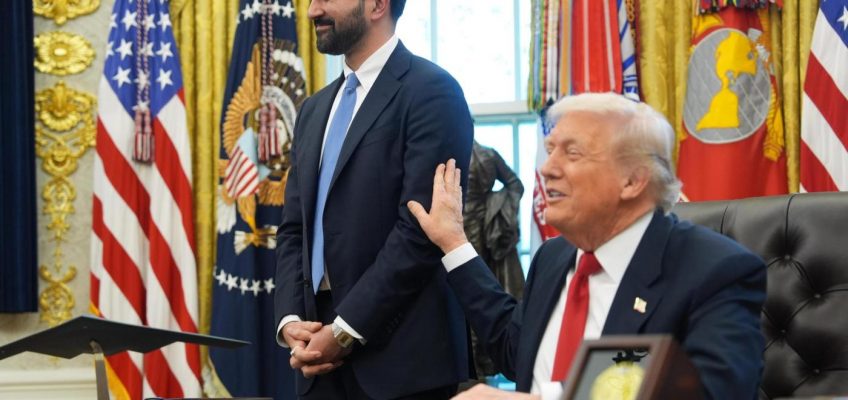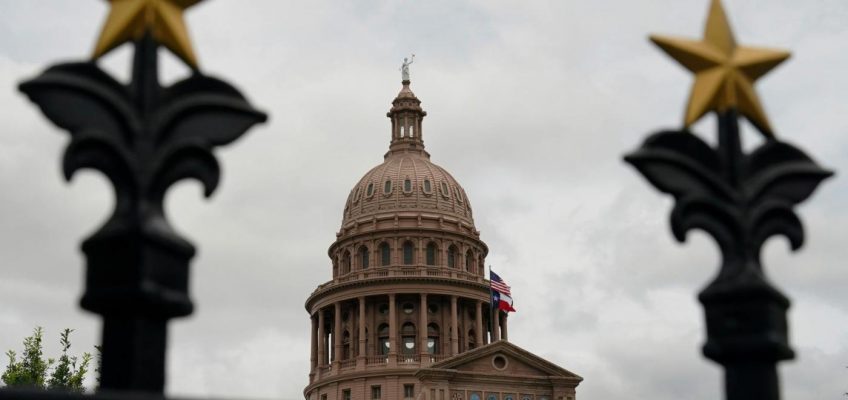The two had called each other “fascist” and “communist,” but when President Donald Trump and New York City Mayor-elect Zohran Mamdani faced reporters in the Oval Office on Friday, they were just two iconoclastic New York politicians who were all smiles.
Related Articles
Texas seeks Supreme Court order to use a congressional map judges held is likely racially biased
Abortion is illegal again in North Dakota after court reverses a judge’s earlier decision
A federal judge blocked Trump’s National Guard deployment to DC but troops aren’t leaving just yet
RFK Jr. says he personally directed CDC’s new guidance on vaccines and autism
Trump administration sues California over giving in-state tuition to immigrants in US illegally
The much-anticipated face-to-face showed how the politicians’ shared love of New York City — and no doubt some political calculus — could paper over months of insults. Both men used a plainspoken, wry approach tailor-made for the age of social media to make their points, and each left the meeting with something he needed.
Here are some takeaways from the appearance.
Republicans lose their punching bag — at least for now
Trump’s party had been queueing up a 2026 campaign warning that the Democratic Party is getting taken over by people like Mamdani, a 34-year-old Muslim and self-described democratic socialist who may not play as well west of the Hudson River. But Trump swatted all that down.
“The better he does, the happier I am,” Trump, a native New Yorker, said of Mamdani.
Trump denied a charge by Elise Stefanik, the Republican candidate for New York governor and one of his political allies, that Mamdani, a longtime critic of Israel, is a “jihadist,” saying, “I just met with a man who’s a very rational person” and adding that they both wanted peace in the Middle East.
Trump said he’d happily live in Mamdani’s New York, countering conservative suggestions that rich New Yorkers should flee the city. He praised Mamdani’s decision to keep New York’s police commissioner, Jessica Tisch, noting she was a friend of the president’s daughter Ivanka. And he demurred when asked about Mamdani’s democratic socialism, saying instead that the two had many similar ideas. He noted — and Mamdani emphasized repeatedly — that they’d both run for office on affordability.
It was an inconvenient defense of democratic socialism on the very day that House Republicans muscled through a resolution condemning socialism with the express intent of embarassing their rivals over the mayor-elect. Trump even threw in some praise of another Republican punching bag, Vermont Sen. Bernie Sanders, also a democratic socialist.
“Bernie Sanders and I agreed on much more than people thought,” Trump said. He added proudly that Mamdani was wowed by a painting of iconic Democratic President Franklin Delano Roosevelt — yet another GOP bugbear — in the Oval Office.
Trump, struggling amid mounting dissatisfaction in his first year back in office, may see an advantage in lashing his star to that of the latest avatar of affordability.
Of course, both Trump and Mamdani are experts at the 21st century art of political brawling and Trump is notoriously mercurial, so the detente may be short-lived. But it’s notable while it’s here.
Mamdani’s visit lets Trump talk about affordability
For the past few weeks, Trump has struggled to address voters’ concerns about inflation, suggesting that prices are already down and any claims otherwise are a “con job by the Democrats.” But Mamdani stomped his competition in the mayoral election by focusing relentlessly on the cost of rent, groceries and other basic needs — a successful strategy that White House officials noticed as they think about next year’s midterms.
The president leaned into that message in their White House meeting, saying he sees his efforts as complementary. He said that just like Mamdani, he too wants to build more housing. The president didn’t lay out any new policies as he repeated his claims that inflation has dropped under his watch.
“Anything I do is going to be good for New York if I can get prices down,” Trump said. “The new word is affordability. Another word is just groceries. You know, it’s sort of an old-fashioned word, but it’s very accurate. And they’re coming down. They’re coming down.”
The challenge for Trump is whether voters trust that he’s genuinely addressing inflation. The consumer price index has jumped to an annual rate of 3% compared to 2.3% in April, when the president rolled out his “Liberation Day” import taxes.
A confidence boost for Mamdani — with implications for his agenda
Throughout his campaign, Mamdani’s opponents claimed his far-left politics and relative inexperience would make him an easy target for Trump. Friday’s meeting will likely quiet those concerns — at least for now. Trump seemed thoroughly impressed with Mamdani, describing him as “a very rational man” who “wants to see New York be great again.”
“We had some interesting conversations and some of his ideas are the same that I have,” Trump added.
For his part, Mamdani struck a delicate balance: flattering Trump in broad terms, while avoiding sensitive subjects or concessions that could enrage his base. He noted repeatedly that many of his own voters were former Democrats who switched over to Trump in the previous election — a line the president seemed to like.
The backing of the president could help the mayor-elect avoid a National Guard deployment in New York, which Trump previously threatened as a likely outcome of his election victory. Trump also indicated that federal funding cuts could be off the table — a move that would give Mamdani a much better shot at achieving his ambitious agenda, which requires raising revenue for programs like universal free childcare.
“I want him to do a great job and will help him do a great job,” Trump said.
Related Articles
Texas seeks Supreme Court order to use a congressional map judges held is likely racially biased
Abortion is illegal again in North Dakota after court reverses a judge’s earlier decision
A federal judge blocked Trump’s National Guard deployment to DC but troops aren’t leaving just yet
Trump administration sues California over giving in-state tuition to immigrants in US illegally
The fallout of Epstein’s crimes span the globe. Here’s a look at some of those paying the cost




